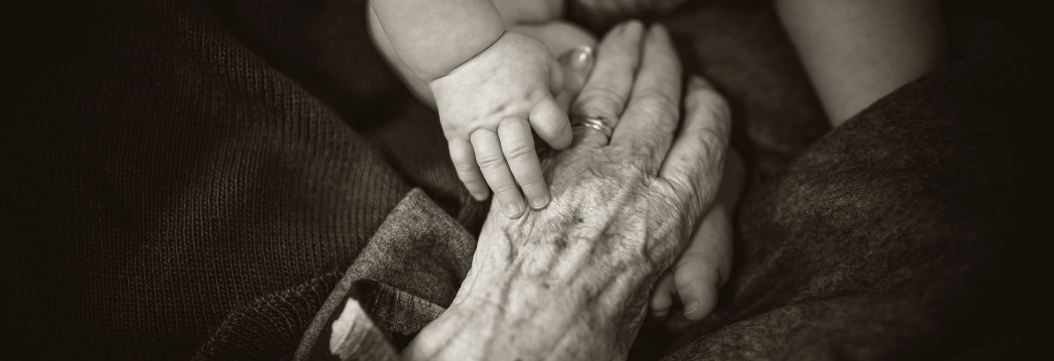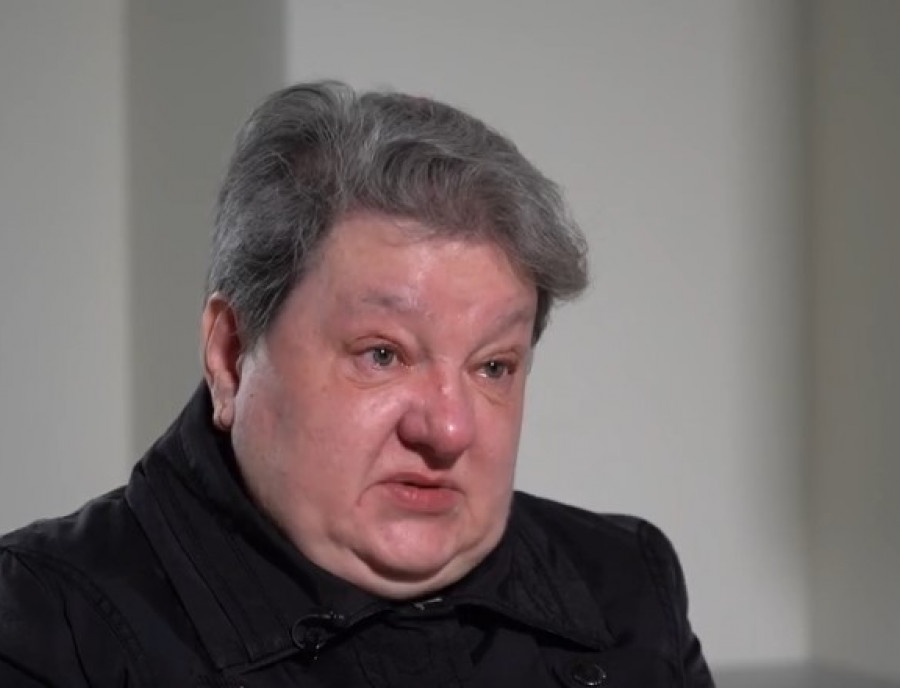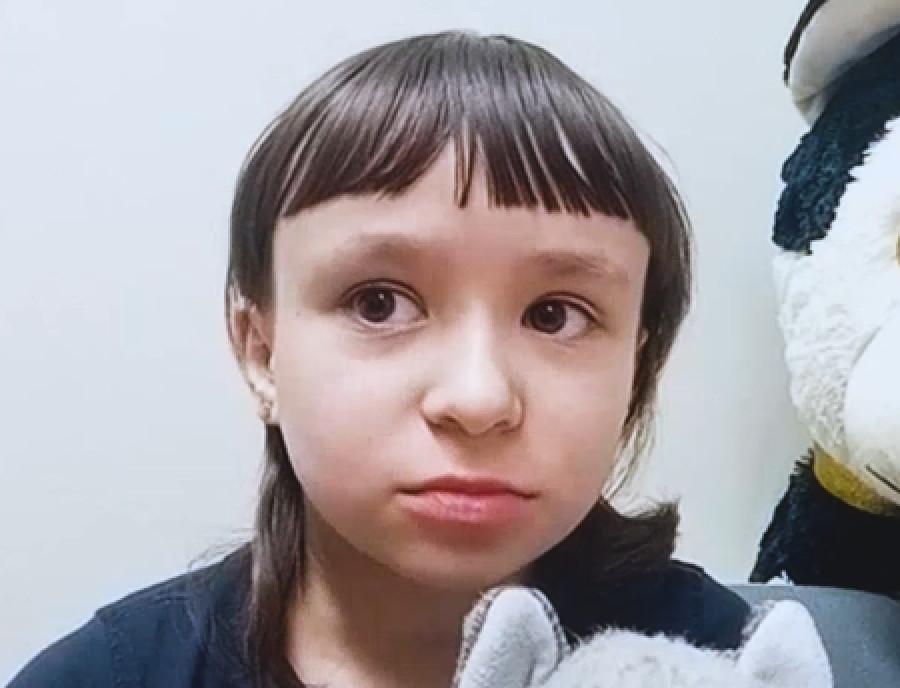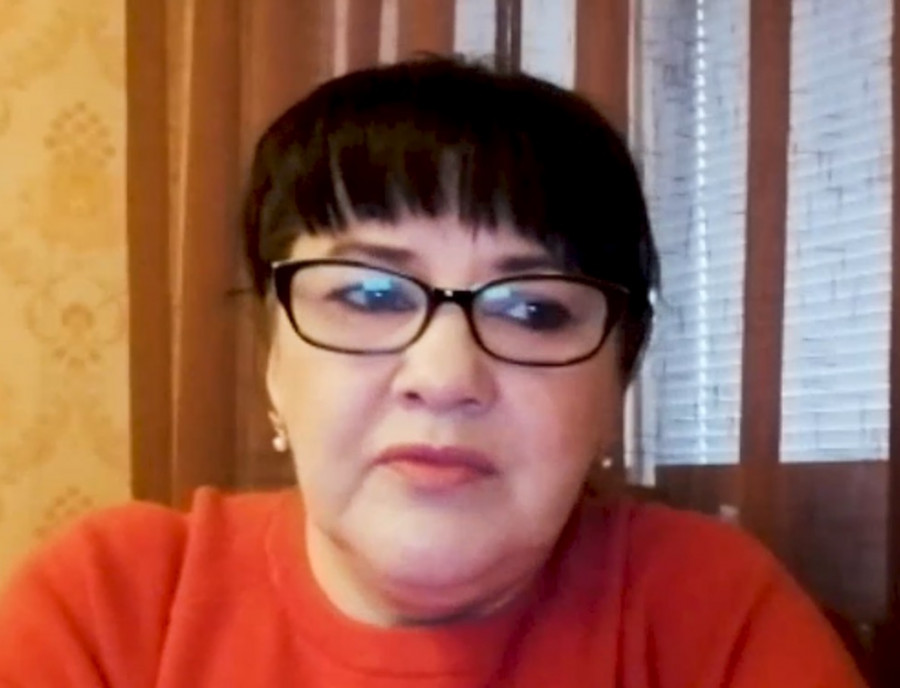“An airstrike. Our daughter is crawling on her knees. My husband shouts, “Inna, she is in blood!”
“The worst day was 13 March, at 09:20 in the morning,” recalls Inessa from Mariupol. “Food cooked on open fire. My husband heated up some boiled water for making tea. Our daughter and I went upstairs to our flat to have some breakfast there. The sound of aircraft. We did not pay much attention to it. The airplane turned around and flew on. I went to the corridor and a terrible explosion followed. Our daughter was crawling on her knees. It was an air bomb dropped in the yard! Everything was smashed and swept off. The windows with the window frames, and the doors too... Everything was covered in dust and smoke. My husband ran inside the flat. I passed our daughter over to him. He shouted, “Inna, she is in blood!”
I am a resident of the city’s left bank, the area of Peremohy Square, to be more specific. Quite a lot of people in our city know it. It is called the Bank House. I don’t know if you knew it, but a long time ago, PromInvestBank had been in this building, and then russian SberBank was located in this house. It is the central building on the square. A very old, Stalin-era residential building. My morning began with the fact that I could not remember the exact time. Maybe it was at around five o’clock, or maybe earlier.
My friend phoned me. She is also our kid’s godmother, who lives in Leningradka. She was terribly afraid of the war and said that it would happen, and so we needed to leave. Which we did not believe, of course. She said, “Inna, it all has started.” Her house is the last one, overlooking the wood lines. She said, “That’s it, we’re leaving, we’re moving to your place.” I said, “Surely, get ready.” She has two kids too, and so their family came over to us together with their dog. Why to us? Because I assured her that we have an excellent bomb shelter, a proper one, built in 1953, with several exits, and everything was provided for there. That is why we would not be afraid of anything there. When they came to us, certainly, everyone kept reading the news. All the TV sets were on.
We realized that all this was happening all over Ukraine, so basically, we had nowhere to go.
Despite the fact that my father-in-law and my mother-in-law lived in Irpin. That is, we did not even think about relocating here, because an attack on the airfield began here in Hostomel. So it did not make sense. We decided that we would all stay in our places and would act according to the situation, as previously. Reading the news, watching TV, and listening to our city mayor, who reassured us and said that everything was under control, that everything was fine, that we were well fortified, and that we would be defending ourselves, everyone decided to stay at home at that time. On 25-26 February, before lunchtime, one could still go to a food store, but then almost everything was already closed down in the left-bank part of the city. Afterwards, people started to plunder, loot and smash this all.
On the evening of 26 February, our power supply went off, and on Sunday morning, there was no water supply any more. Against the backdrop of all this, the telephone connection began to disappear.
We turned out to be amid some vacuum. We could no longer get in contact with anybody. Furthermore, we did not understand what was happening, and we only knew one thing that we were told. It was no longer possible to leave because the city was already surrounded. Columns of vehicles were shot. People could only try [to leave] at their own peril and risk. That is why, like everyone else in our city, we became hostages of all this happening around us and began to think about how to survive. Naturally, a terrible cold seized our flat. We did not stay for the night in our flat any more because the children were very scared. Luckily, the bomb shelter was in our section of the building. It took us just a minute to go down there, roughly speaking, as we lived on the ground floor. We still kept dropping in to our flat to have some food there. We could still cook some food on the gas stove. The gas supply was very unstable. The pressure [in the gas pipes] was very weak.
The struggle for survival began, but without incoming artillery strikes directly into the yard so far.
There was some incoming artillery fire, somewhere nearby. It did hit. Leningradskyi micro-district was damaged all over, but we still continued to live there. For about a week, we lived in a nightmare, with cooking on open fire, because the gas supply stopped. All gas pipes were broken. At some point, there was an incoming artillery strike on Peremohy Avenue, near the bus stop. The window glass shattered in one of our rooms. That was the very first challenging moment of it all. As it turned out later, this was probably the easiest moment.
Next, we had a fire that broke out in the store located below our flat… There was a huge online clothing store that was set on fire. By that time, we had no water, and no firemen. It was impossible to get through to them.
We put the fire out with our bare hands and attempted to bring some water from the neighbouring kindergarten, by passing buckets with water [in chain order]. We all lined up and formed a chain. At the same time, shelling attacks were continuing.
We hid the children in one of the entrance halls. It was already hardly possible to breathe because of that smoke that came from those clothes. Basically, we managed to bring the fire under control. We remained alive. Our men got some burns. Their hands and faces were all black. But we extinguished the fire, and thus, we could continue to stay in our bomb shelter. The number of people was unrealistic. The youngest kid was only two weeks old, and there were other children of all age groups too. Everyone came to us: people’s relatives and neighbours, because the bomb shelter was really very good, indeed.
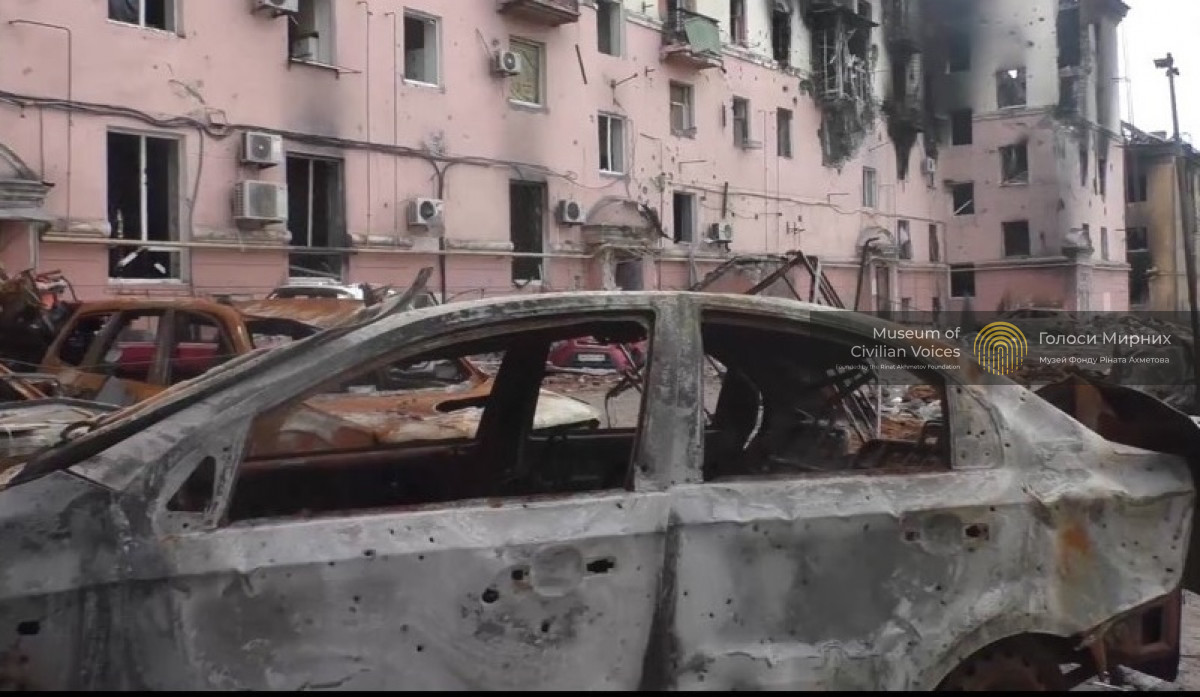
Thus, we survived until the first Saturday, when the first evacuation was supposedly announced. In our joy, we packed our things (they were already packed), got into the car and tried to drive to the city centre. It turned out that there was still life in the city centre. It was not the same is in the left-bank part of the city. The left-bank part was stricken by complete chaos, looting, and falling artillery shells. There were still police there, and there were still some authorities. I can’t pick the proper name, but those authorities who still informed somebody about something. When we came to the Drama Theatre and made a circle around it, we were told that there was not any evacuation there. That nobody offered us anything. There was no “green corridor”. Well, you could leave at your own peril and risk, but russian troops were already stationed everywhere, so this leaving was very dangerous.
We circled around and went to our close friends who lived near Bakhchivandzhy [Street]. And we would probably have stayed with them there, but fate decreed so that we forgot a small bag with documents at home, and we had to return. When we returned to our yard, everyone hugged us happily, those who remained there. They said, “Oh, it is so good that you have returned.”
And we continued to fight further. It was another tough week, when we had incoming artillery strikes hitting nearby, hitting in the neighbouring yards, when we lived through the cold weather, through sickness, experiencing lack of water, which we drained from the heating system, and which we searched for checking some boilers.
It is difficult to describe all those feelings now. How I was angry with myself, and how I hated everything around. I didn’t understand why all this was happening, why no one was doing anything, why they did not help us, why they did not bring at least some corny bread and some water to us. Although no, they did bring some water to our yard twice, but it was hard to get it standing under shelling. Well, we got some of it. We filled everything we could. And then the worst day ever happened, one of the worst days of my life. It was 13 March, 09:20 in the morning. At that time, we did not have any gas supply any more, we had nothing.
We cooked all the food in the yard on barbecue grills, on some kind of makeshift stoves, on bricks. Just like everyone else, my husband heated up some boiled water to make some tea in a thermal flask, to have some tea. My daughter and I went up to our flat from the bomb shelter to have some breakfast there, because it was dark in the bomb shelter, while we had at least some table and some daylight, some piece of civilization at home. At this point, we heard some sounds of aircraft. We had heard those sounds before, so we did not pay much attention to them. However, I still walked up to the window and looked out to see where this plane was. It seemed to be circling above, but then it turned around, as it seemed to me, and flew on.
And then I just went to the corridor to take something. I cannot describe what happened in that second. It was just an atomic explosion, just like a nuclear blast, and I did not understand how it happened. My daughter ran up to me; she was actually crawling on her knees. We were standing in the corridor. It was an air bomb. It was an air strike that hit our yard. It just took everything out, smashed and swept everything off. The windows – it was not just broken glass. The window frames, the transoms, and the interior doors were all damaged, as well as everything that was in people’s flats. Everything was swept to the other side of the flat.
Everything was covered in dust, gas, and smoke. It was impossible to breathe. I was coughing. At that moment, my husband rushed inside the flat and asked, “How are you?” I said, “I don’t know, but we seem to be okay.” He said, “Give me our daughter.” I pass our daughter over to him and he took her further on, so that we could go down to the bomb shelter. And at some point he shouted, “She is covered in blood! Inna, she is in blood!
And I saw that she had blood all over her face. The crowd of people squeezed us in the bomb shelter. I shouted, “I have a wounded child here!” I ran into the flat. I tore off a piece of cotton wool, then I covered her face, and we tried to run out of the entrance door. Roughly speaking, municipal hospital no. 4 was just across the road from us. But we still had to run some distance to get there... while the shelling continued and it was just crazy. However, we had no choice.
My husband ran in front together with our daughter, and I ran behind them carrying a backpack with our documents inside. When we crossed Pashkovskoho Street, we started shouting, “Help, we have a wounded child here!” Well, it’s good that... I just don’t know…, at that moment there were still doctors in hospital no. 4. Apparently, they knew, saw, and heard what happened. They understood that there would be a huge number of wounded people now. They were already standing at the corner. When we started shouting that we had a wounded child with us, they just ran out and took her. Then we ran to the department; it was in the surgery department. They received us right in the hallway.
There was no one in any of the rooms by that time because it was very dangerous. All the treatment couches or beds, all the operating room tables, were just in the corridors. They had power generators running. The surgeons examined our daughter and began to comfort and reassure me. They said, “Compose yourself. She will be all right.” They quickly placed her on the couch. Two young surgeons ran up and examined her. They started to give instructions to their assistants. They said, “Please, give us the suture material. Whatever you have, bring it here.”
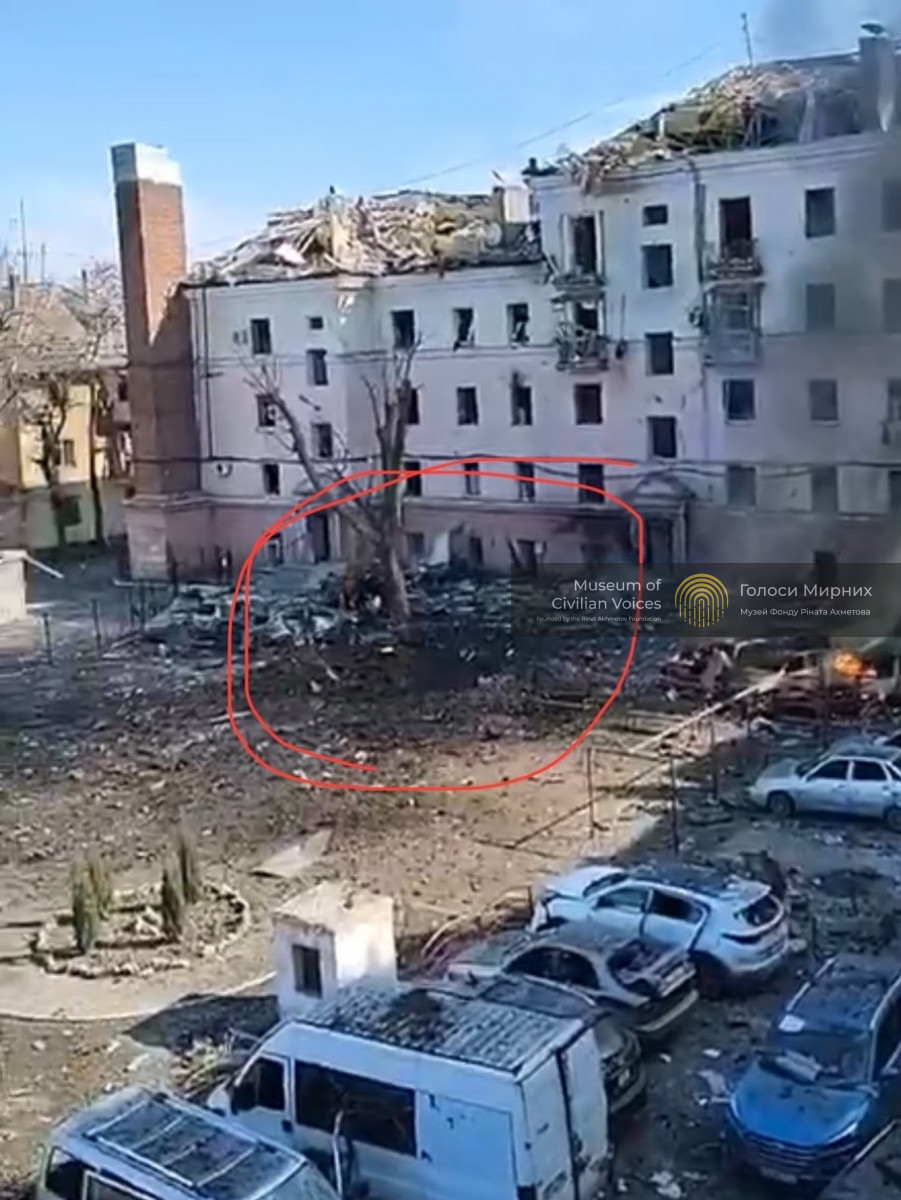
They did not let me be near her, so I stayed with my husband. At that time, our elder son remained in the bomb shelter. We did not know what to do, whether to run there to him or not. Although all our friends and neighbours were there. We knew that they would not leave him unattended there. We understood that we needed to stay here with your daughter. Well, the doctors just did the impossible. They even anaesthetized her, they found some lidocaine. They stitched her up, and they used a fairly good suture material for that.
Well, it was because she was a little girl of six years old with a wound on her face. But then, an even worse hell began. They began to bring the wounded from our house and a neighbouring house. There were three air bombs in total. One fell on Pashkovskoho Street, the second bomb landed between Pashkovskoho and into the garages, and the third one fell in our yard. Those were such terrible pictures...
They were all covered in blood, and they were mutilated.
I felt just half-dead myself. When they gave us back our daughter, they said, “You have come out of it almost unscathed, we might say.” I don’t know how it happened so that we got off quite lightly. We were seated on a sofa there. They said, “Wait out the shelling here.” However, the shelling did not stop. They gave our daughter some food, gave her some juice to drink, and gave us some hot tea. It was simply incredible in those conditions and in that situation. We were sitting there covered with blankets. Those people were laid on the floor, on top of blankets.
And then, the triage began, as the doctors call it. They took the younger ones, those who did not have severe injuries. Because, as the surgeon said, “I spent six hours near one patient, but he died. I could have saved other people’s lives during this time.”
After that, some volunteer took us under his guidance... he helped us run back to the house. Everyone was waiting for us. They were even afraid to ask what happened to us. As our daughter was injured, we left her in the bomb shelter, while we ourselves ran up to our flat, at least to take out those window glasses, all these window frames. To take that all out and do something next. To board up the windows with at least something, because it was 12 degrees below zero outside, and there was nothing at all anywhere. At the time when that bomb fell, all the cars that were in the yard burned down completely, including our car.
We buried 13 people in that pit, in that crater, which was left by the aerial bomb. It was almost impossible to identify those dead. Those were some body parts, those were some burnt parts.
We additionally buried several more people there. Those who were found in their flats, somewhere under the rubble. And also some of those (I cannot give the exact number) who died in hospital no. 4. At once. You know, later their relatives asked why we did not file any list. To be honest, no one thought about it at that moment. We just had other things to worry about. Then another terrible week of struggle came. Struggle amid the cold. We could not get warm. As for food, oddly enough, we had enough of food, and there were some food supplies at home.
. The worst thing was about the water. We just shared every drop of it.
We fought each other [over it]. The next week passed under terrible shelling. Now the artillery strikes hit the house, and there were some phosphorus bombs. The flats were on fire again, and the roof was burning. We extinguished all that on our own, without water, manually, just by beating it out. A weak telephone signal re-appeared from time to time then. On the fifth floor of our house, I could catch some telephone signal and even make a phone call. The easiest thing was to write a usual text message, SMS, which we used to write when mobile phones appeared first.
Our relatives, our parents, and friends who left earlier, who were not in our region, they wrote, “Leave, they have started letting people out. Leave there.” We explained it to them, “Those who are in the city centre are able to leave. Leaving the left-bank part of the city is tantamount to just dying right away.
It is impossible to leave. There is no road. The bridge has been damaged. You cannot drive along the embankment. You cannot go through Mukhine either. They either shoot you or order you to go back.” We reached that boiling point when we realized that we had to leave, otherwise we would just die here. We were very worried and afraid for our daughter. After she got wounded, we just could not allow a mistake like that happen to us again.
Having wrapped ourselves up in a blanket, we also took our daughter’s godmother and her two children in that small car, since her husband’s car did not have any wind shields and windows left. It would be absolutely impossible to go by that car with children inside. So we left on Monday, 21 March. It was at around the midday. I am thankful to those people who told us the route just step by step, just by baby steps. Without knowing this, we would never have left.
The embankment was strewn with damaged vehicles, electricity poles, wires, shells, and dead bodies of civilians. I did not see the military.
The dead were just lying out there. We came across them here and there along our entire journey. When we got to the main entrance of the steel plant, we realized that apparently that place was also hit by an airstrike. There was a huge pit there. We had to go around it, and we went around it driving on the wrong side of the road. When we drove to the so-called Humpback Bridge, which ran parallel to the Post-bridge, I thought to myself, “We are likely to be able to leave, we will survive, I suppose.” Although we still had to cover quite a long way before we could exit the area. Then we drove through the harbour, along Slobodka and across the railway crossing. We then reached the railway station, and when we were at the roundabout, near Chaika Hotel, we were screaming. I don’t know what happened to us at that moment. Well, there was a more or less normal road there, and we all knew that we had to drive up just a little more to the exit, in the direction of Melekine, and we were almost saved.
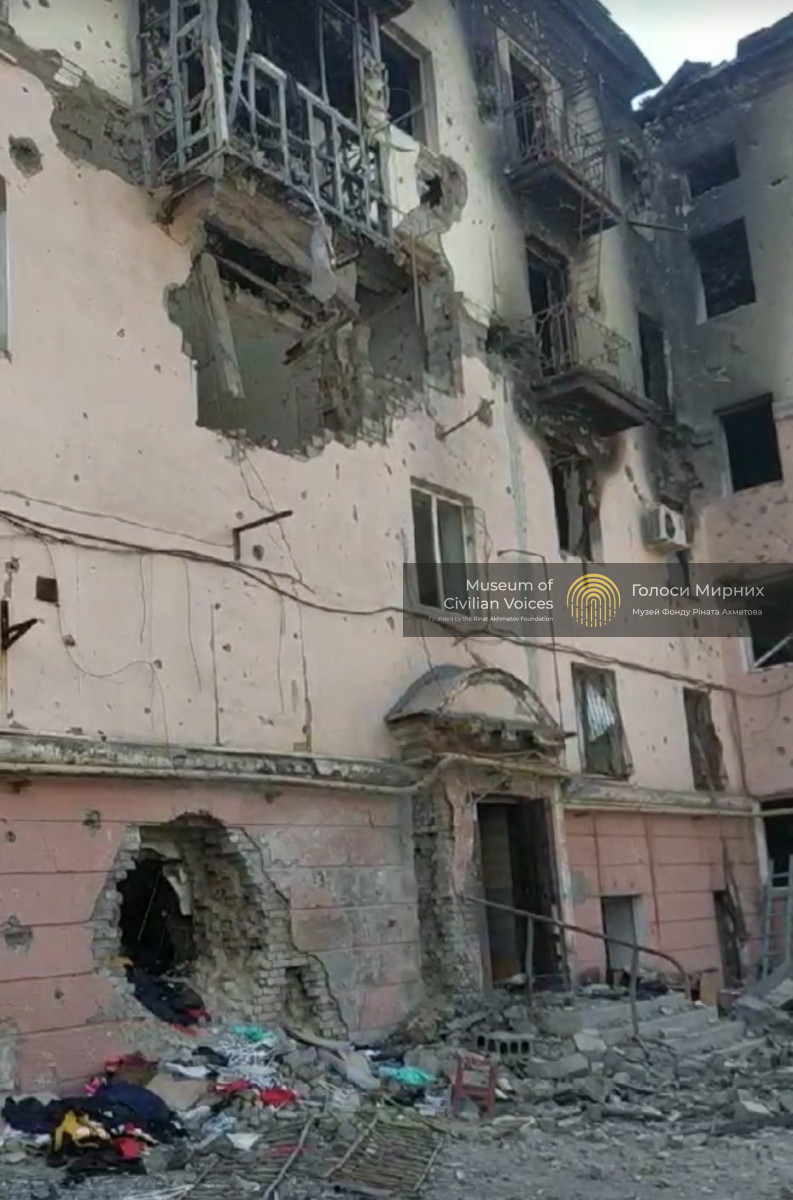
We stood at the exit from the city for a very long time. We could see there that there were other people around us. It turned out there were still plenty of people there. Everyone was leaving. People had cars, and those cars were not damaged, they were intact. I don’t know whether those people hid their cars and how it worked out for them, but the column of cars was terribly long. That was a very hard trip... We reached Berdiansk by midnight. Some of our acquaintances sheltered our children and us. We stayed in Berdiansk for three days. We had to have our daughter’s stitches removed. In addition, we needed to re-fuel the car. We needed to take a shower or at least just wash ourselves after almost a month without water, without bathing, without all that. So three days later, we were going to leave for Zaporizhzhia. Well, it did not work out well from the first try. The column of cars was not let out. A heavy fighting began near Vasylivka. We drove off the main road and went to the first village we came across. We are thankful to our local people, as we were sheltered there, all of us from that huge column. They sheltered us in their houses and fed us.
They turned on the heating, and that was the first day when I got warm since 24 February.
And the next day, early in the morning, we all tried to leave and now our column of cars was out. When we saw the Ukrainian flags from the “grey zone”, we started crying, we sobbed. We were ready to make a stop and just kiss those military and police officers. I don’t know who exactly they were. Emergency service rescuers, perhaps. When we got to Zaporizhzhia, we felt just like in some other world.
Yes, there was war everywhere, but still everything worked there in the city. Fuel stations worked there, and there was electricity too. People lived in their houses there. But how? Why was Mariupol simply destroyed?
This question will probably remain open for now. God willing, we will hear a truthful answer to it someday. Now those who were waiting for the so-called “Russian world” have returned there and they say that they are fine now. Whatever it was… Well, as for us, our story is that we came from Donetsk back in 2014. Notably, we ourselves were born and raised in Mariupol, but it so happened that we lived in Donetsk. We left a flat there. We had lived in a rented flat for a very long time, and a year ago, my mother said, “How long are you going to live in discomfort? Let me help you and you buy a flat.” So we bought out a flat, the one that we rented. We already knew all the people in the yard, all our neighbours. On 5 November, it will be one year since my mother is gone.
Another big pain for me. Well, I know the reason well. It was COVID. We feared that our hospital was not ready for it, and after the death of my mother, when I had not yet come to my senses, the war broke out. Now I feel like I do not live my own life but I just exist. The only thing I want is to wait for the end of all this and see, as they say, the victory of the good over the evil.
When quoting a story, a reference to the source – the Museum of Civilian Voices of the Rinat Akhmetov Foundation – is mandatory, as follows:
The Museum of Civilian Voices of the Rinat Akhmetov Foundation https://civilvoicesmuseum.org/
